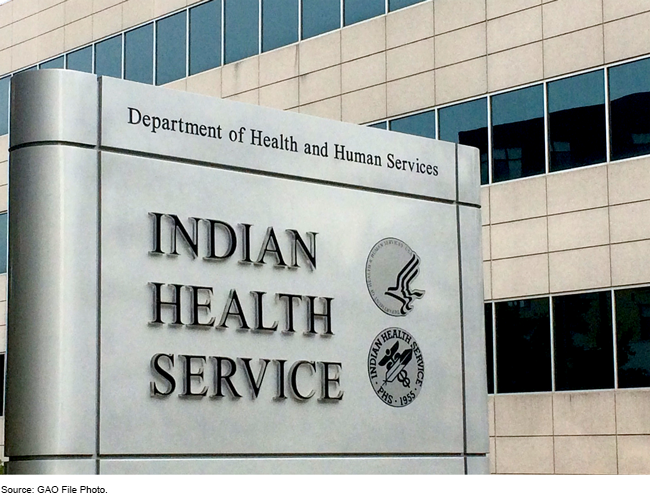Indian Health Service: Relief Funding and Agency Response to COVID-19 Pandemic
Fast Facts
Indian Health Service provides health care to 2.6 million American Indians and Alaskan Natives. Outdated facilities, few inpatient beds, and health care provider shortages make IHS's pandemic response especially challenging.
IHS took steps to mitigate these challenges by using its $9 billion in COVID-19 relief funding to address immediate and longstanding needs, e.g., covering vaccine- and testing-related costs and implementing a video telehealth system.
IHS also adjusted its care delivery, changed policies, and coordinated with partners. For example, it worked with the Veterans Health Administration to help meet its staffing needs.

Highlights
What GAO Found
The Indian Health Service (IHS) received more than $9 billion in COVID-19 relief funding, an amount 50 percent greater than its fiscal year 2020 total budget authority. These funds have been used to address both immediate and longstanding needs. IHS allocated funds across the IHS system—including to federal, tribal, and urban Indian organization facilities—for health care services, protective equipment, testing supplies, and vaccine-related costs, among other purposes. Funding is also being used to address certain longstanding, systemwide needs, including replacing an obsolete electronic health records system, implementing a clinical video telehealth system, and funding dozens of sanitation and potable water projects. Overall, 62 percent of these funds were obligated and 57 percent were expended as of September 30, 2021.
IHS took steps to mitigate workforce, supply, and facility challenges to its COVID-19 response through coordination with partners, policy changes, and adjustments to care delivery. To help address workforce challenges, IHS implemented a new critical care response team, coordinated with other federal agencies (such as the Veterans Health Administration) to meet staffing needs, and implemented payment and hiring flexibilities to retain and more quickly hire staff. To help address supply challenges, IHS coordinated with federal partners while area offices developed new processes for tracking supply levels and needs. To help address facility challenges related to outdated infrastructure and space limitations, IHS hospitals reported implementing care adjustments such as offsite and drive-through testing and using medical tents for testing and treatment.
A Drive-Through Outdoor COVID-19 Testing Site at Whiteriver Indian Hospital on the Fort Apache Indian Reservation

Why GAO Did This Study
IHS provides care to about 2.6 million American Indians and Alaska Natives (AI/AN), directly through federally operated IHS facilities (including 24 hospitals) or indirectly through facilities operated by tribal or urban Indian organizations. Regional oversight is provided through 12 area offices.
As the COVID-19 pandemic progressed, tribal lands became hotspots for rapid spread, with infection rates in some areas, such as the Navajo Nation, among the highest in the country. With higher prevalence of certain diseases, such as diabetes and heart conditions, AI/ANs may be particularly vulnerable to COVID-19. At the same time, outdated facilities and equipment, high provider vacancy rates, and few inpatient beds could make an effective response by IHS potentially more challenging.
The CARES Act includes a provision for GAO to report on the federal response to the pandemic. This report describes, among other things, COVID-19 relief funding for IHS, tribal, and urban Indian health facilities; and steps IHS took to address challenges that IHS hospitals faced in responding to the pandemic.
GAO surveyed all 24 federally run IHS hospitals; reviewed IHS documents; interviewed officials from three IHS area offices selected for variation in geography, incidence of COVID-19, and other factors; and met with national stakeholder organizations.
GAO provided a draft of this report to the Department of Health and Human Services (HHS), including IHS. HHS provided technical comments, which GAO incorporated as appropriate.
For more information, contact Jessica Farb at (202) 512-7114 or farbj@gao.gov.
